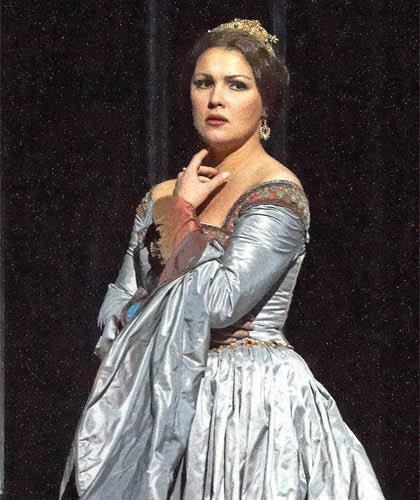Opera stars pull out of tour of Japan over radiation fears

The meandering caravan that is the Metropolitan Opera while on the road arrived as scheduled in Japan this week for a long-planned 14-performance tour in Nagoya and Tokyo. But it is without two of its most adored stars who have dropped out at the last minute because of fears about earthquake-related radiation.
Breaking the bad news at an awkward press conference in Tokyo yesterday, the general manager of the Met, Peter Gelb, conceded that the company had been forced to "scramble over the weekend to find replacement stars" after Anna Netrebko, the Russian-born soprano, and Joseph Calleja, a Maltese tenor, pulled out because of the concerns about radiation leaks in the country.
"Anything can happen in the volcanic world of opera, and with this tour it seems that our volcano has momentarily erupted," Gelb told reporters.
"We are particularly grateful to the stars that are rallying to our side from around the world in support of the Met and the Japanese people... our show will go on."
Even before packing up from New York, the Met management had gone to lengths to reassure the performers, stage-hands and other technicians that there was no danger associated with the tour – even though the radiation leak at the Fukushima nuclear power plant, hit by the early March earthquake and tsunami, has yet to be fully contained.
Most union members with the company were required under the terms of their contracts to make the journey. When it travels, the company is 350 people-strong. But the Met has no such control over the international stars recruited to take solo roles in its productions.
And opera stars, Mr Gelb implied, can be a flighty lot. "I think there is a lot of confusion out there and for people who are naturally anxious or concerned... this prays on people's fears when reports are not clear on the situation in Tokyo," he said.
Opera fans in Japan may be especially disappointed by the decision of Ms Netrebko, who is sometimes dubbed "La Bellissima" thanks to her radiant looks or "Audrey Hepburn with a voice".
She is a favourite of opera houses around the world. In London, she raised the roof at the last night of the proms in 2007.
By the same token her anxiety, as someone who grew up with family members directly touched by the 1986 Chernobyl disaster, is the most understandable. Her parts on the Japanese tour will now be sung by young soprano Marina Poplavskaya, from Moscow, who was released from concert commitments in Paris.
"She changed her mind because of the emotional weight of having also lived through the tragedy of Chernobyl," the Met statement said. "She didn't feel she would be able to present her best performances and didn't want to disappoint her Japanese fans."
It took just as long for Mr Calleja, who has made joint appearances with Renee Fleming and Michael Bolton and is known to Royal Opera House fans, to make his decision to skip Japan. Replacing him will be both star tenor Marcelo Álvarez, cutting short a holiday in Argentina, and fellow tenor Rolando Villazon.
For the Met, which last visited Japan in 2007, the disappointment of the withdrawals is offset by the success of finding the replacements.
The full menu of performances has been preserved. The company will perform "Don Carlo", "La Bohème" and "Lucia di Lammermoor" this weekend in Nagoya.
While Nagoya is further south in the Japan archipelago, Tokyo is only 140 miles south of the tsunami-affected area and the stricken nuclear plant.
No-go zones
* The Osaka leg of the teen pop sensation Justin Bieber's world tour was said to be jeopardised last month, when crew members reportedly refused to travel to Japan for a concert on 17 May for fear of radiation poisoning. However, this particular show went ahead as planned anyway.
* Tennis Australia risked a one-year ban from the sport when it refused to send a team to face India in a Davis Cup tie in Chennai in 2009, citing fears over security risks during the Indian elections. The Indian team was named default winner, but the Australian team was not banned.* England international cricketers forfeited a World Cup match with Zimbabwe in 2003 when players refused to travel to Harare after receiving death threats.
Join our commenting forum
Join thought-provoking conversations, follow other Independent readers and see their replies
Comments